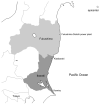A Comparison of Mental Health among Earthquake, Tsunami, and Nuclear Power Plant Accident Survivors in the Long Term after the Great East Japan Earthquake
- PMID: 36360954
- PMCID: PMC9659037
- DOI: 10.3390/ijerph192114072
A Comparison of Mental Health among Earthquake, Tsunami, and Nuclear Power Plant Accident Survivors in the Long Term after the Great East Japan Earthquake
Abstract
Even now, ten years after the Great East Japan Earthquake (GEJE), thousands of residents of Fukushima Prefecture are still living as evacuees. To understand the mental health states and needs for psychological care of the survivors, we conducted a questionnaire survey of survivors who were evacuated from Fukushima to Ibaraki due to the nuclear power plant accident and of the residents of two areas in Ibaraki where damage was particularly severe due to the tsunami or liquefaction. Our results show that stress related to participants' hometowns and to the disaster was a risk factor for depression and post-traumatic stress among the survivors in the medium to long term in all regions examined. Other risk factors for post-traumatic stress differed by region. This study shows that in a complex disaster such as the GEJE, where damage is widespread, the causes of damage and the experiences of disaster survivors differ greatly from region to region and that risk factors for depression and post-traumatic stress among disaster survivors over the medium to long term may also differ. To provide appropriate care to disaster survivors, it is necessary to determine what is causing the risk of depression and post-traumatic stress at any given time and in specific regions.
Keywords: depression; post-traumatic stress; regional difference; risk factor; the Great East Japan Earthquake.
Conflict of interest statement
The authors declare no conflict of interest.
References
-
- Measures Taken by the National Police Agency and Damage Conditions of the 2011 Tōhoku Earthquake and Tsunami. [(accessed on 5 September 2022)]. Available online: https://www.npa.go.jp/news/other/earthquake2011/pdf/higaijokyo.pdf.
-
- Deaths Due to the Great East Japan Earthquake from Vital Statistics. [(accessed on 8 August 2022)]. Available online: https://www.mhlw.go.jp/toukei/saikin/hw/jinkou/kakutei11/dl/14_x34.pdf.
-
- Change in the Number of Evacuees. [(accessed on 5 September 2022)]. Available online: http://www.reconstruction.go.jp/topics/main-cat2/sub-cat2-1/20181228_hin....
-
- Steps for Revitalization in Fukushima Prefecture. [(accessed on 10 August 2022)]. Available online: http://www.pref.fukushima.lg.jp/uploaded/attachment/518132.pdf.
-
- The Number of Evacuees in Japan. [(accessed on 5 September 2022)]. Available online: https://www.reconstruction.go.jp/topics/main-cat2/sub-cat2-1/20161028_hi....
Publication types
MeSH terms
LinkOut - more resources
Full Text Sources
Medical


